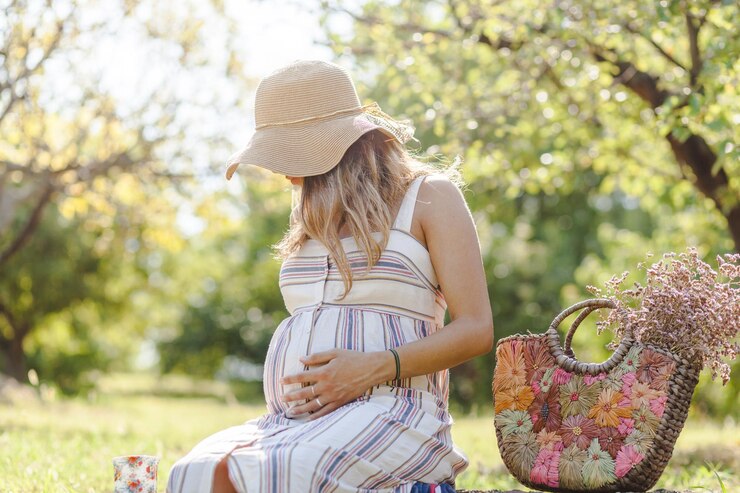 During pregnancy, a woman's body undergoes a series of physiological changes: the increase in maternal blood volume for adequate blood flow to the placenta requires sufficient hydration (about eight glasses of water during the day).
During pregnancy, a woman's body undergoes a series of physiological changes: the increase in maternal blood volume for adequate blood flow to the placenta requires sufficient hydration (about eight glasses of water during the day).
On top of that, the heat could be potentially annoying, following the kilos gained which create a "blanket" effect, and could also be a cause of dehydration. Through sweating, there is a higher risk of loss of liquids and mineral salts, precious for the maternal-foetal balance.
What are the symptoms of dehydration?
- intense thirst;
- muscle cramps, especially at night;
- weakness;
- dizziness;
- palpitations;
- anxiety;
- dry skin;
- low blood pressure;
- dark urine (not the pale yellow colour it commonly should have).
What to do?
• reintroduce lost liquids by drinking plenty of water or other beverages (especially herbal teas, orange juice…);
• if your symptoms do not improve, contact your gynaecologist immediately.
Useful tips to live through the summer peacefully and without risks:
• drink at least 2 litres of water a day and follow the instructions of your doctor to avoid the risk of dehydration;
• limit the consumption of carbonated or sugary drinks, tea and coffee intake. Avoid very cold drinks and alcoholic beverages;
• take care of your diet, eat light meals, rich in water and mineral salts (fresh fruit and vegetables);
• pay attention to the correct preparation and storage of foods;
• if approved by your doctor, do draining massages as the heat expands the capillaries and swells your legs, ankles and feet.
During heat waves and the hottest hours of the day:
- improve the microclimate of your home by darkening the windows with curtains and blinds;
- close the windows during the day (especially when the Sun beats down), opening them during the coolest hours of the day;
- spend the hottest hours in the coolest room in the house;
- drink more regularly and try to exercise less;
- if you have an air conditioner, set the temperature between 21 and 23 degrees;
- avoid the simultaneous use of appliances that produce heat and consume energy;
- if you are hot, take baths and showers with warm water, wet your face and arms with cool water;
- wear light, loose clothing.
Outdoors:
- avoid going out during the hottest hours of the day and walking along busy streets where pollution levels are highest;
- protect the skin of the face with sun creams with a high protective factor;
- wear loose clothing and open shoes which reduce perspiration and overheating and muscle swelling;
- remember to cover your head with a hat if exposed to the Sun;
- check that your tummy is not overheated, causing discomfort to the baby. In that case, head for the shade or freshen up with a nice shower;
- always carry a bottle of water with you, in case of need.
If you go on vacation:
- plan trips by getting information on heat wave risk forecasts in the place where
destination; - ask your doctor for consent to ensure that the trip or destination is safe based on your pregnancy;
- check where the nearest hospital or pharmacy is and how it can be reached;
- bring your maternity documents with you;
- remember to have draining massages (if approved by your doctor).
If you go by the sea:
- you can sunbathe but with some precautions; it is advisable to expose yourself only in the cooler hours of the day (early morning or late afternoon);
- always use protective creams to avoid burns and the appearance of dark spots on the skin (more frequent during pregnancy due to hormonal changes);
- take barefoot walks on the shore to promote blood circulation.
It is good to know that, even under an umbrella, you are not protected from the heat or from the sunrays.
It is important to know that… Heat waves will always be more intense and more
frequent due to climate change and global warming. You too can contribute to reducing greenhouse gas emissions in your daily actions, for example by avoiding energy waste at home, choosing eco-sustainable means of transport (public transport, bicycle, on foot), and eating less foods processed by industry.


